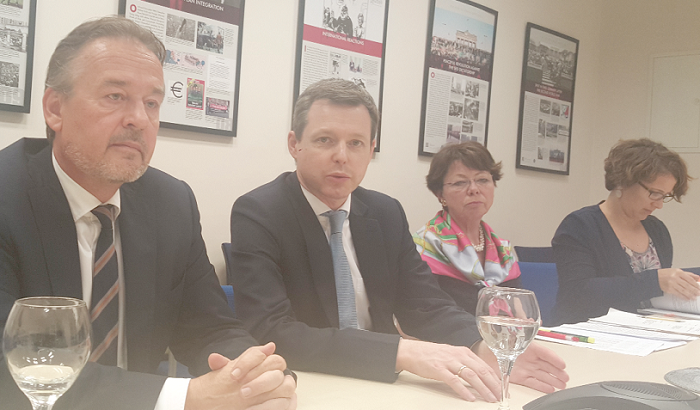
Germany places Africa on top of G-20 agenda
In its role as the current Chair of the Group of Twenty (G-20) Countries, the Federal Republic of Germany has placed Africa on top of their political agenda, the Deputy Minister of Germany for Economic Cooperation and Development, Mr Thomas Silberhorn, has announced.
Advertisement
He said Germany also “stands ready to continue its long-standing and constructive cooperation with Ghana.”
The deputy minister noted that these, and the upcoming European Union (EU) - Africa Summit in November this year, demonstrated that the interest in Africa was really rising.
Mr Silberhorn announced these at a press conference at the German Embassy in Accra yesterday.
The deputy minister paid a two-day working visit to the country during which he met with government officials and encouraged them to take advantage of Germany’s rising interest in Ghana in particular, and Africa in general, especially the government’s dedication to private sector reform.
Mr Silberhorn noted that domestic revenue mobilisation was key and learned how Ghana intended to tackle this important issue.
The deputy minister, who had earlier visited some projects initiated by the German Development Cooperation, touched on the Ghana Interbank Payment and Settlement Systems (GHIPSS) and the German financed biometric payment mechanism E-Zwich.
He pointed out that digitisation would provide great opportunities for African countries and added that such an innovative payment mechanism did not only give many people access to the banking system but was also a relevant tool for the government to fight fraud and corruption.
“Since authorisation in the E-Zwich payment system works through the biometric fingerprint, abuse is easily detected,” he stated.
Mr Silberhorm was also happy to announce that vocational training was very high on his agenda and that the German dual system integrating industry in vocational training was high in demand and Germany had successfully collaborated with the Council for Technical Vocational Education and Training (COTVET) for several years.
G-20
The G-20 is made up of 19 countries, namely Argentina, Australia, Brazil, Canada, China, France, Germany, India, Indonesia, Italy, Japan, South Korea, Mexico, Russia, Saudi Arabia, South Africa, Turkey, the United Kingdom, the United States of America and the European Union.
G-20 members together account for roughly 85 per cent of the world’s economy, that is around three-quarters of global trade and two-thirds of the world’s population.
The G-20 presidency rotates between members and is picked from different regions each year.
The finance ministers and central bank governors of the G-20 countries meet twice a year.
The deputy minister said his country was interested in improving and saving the lives of the people and was also concerned about the environment and the climate, among other things.
He observed that Africa had been ignored for a very long time by many and it was time that the situation was addressed.
Mr Silberhorn regretted that a lot of money was generated in Africa but the money found its way elsewhere or to safe havens.
“Safe havens are a challenge to Africa and what needs to be done is the creation of the needed awareness to ensure transparency and a fair global order and the prevention of abuse of public funds,” he said.
Marshall Plan
The deputy minister also touched on Germany’s new strategy for cooperation with African countries, which covers such areas as trade, business development and energy and education.
The new strategy calls for better market access for African exports, an end to illicit financial flows from Africa and tax evasion by multinational companies.
Mr Silberhorn said African governments and leaders had an important role to play towards making the plan work to support African governments which welcomed the reforms.
German Ambassador
For his part, the German Ambassador, Mr Christoph Retzlaff, said he was happy that there was growing interest by German companies in Ghana.
He said two officials from Siemens, which is a German conglomerate company, had visited Ghana.



